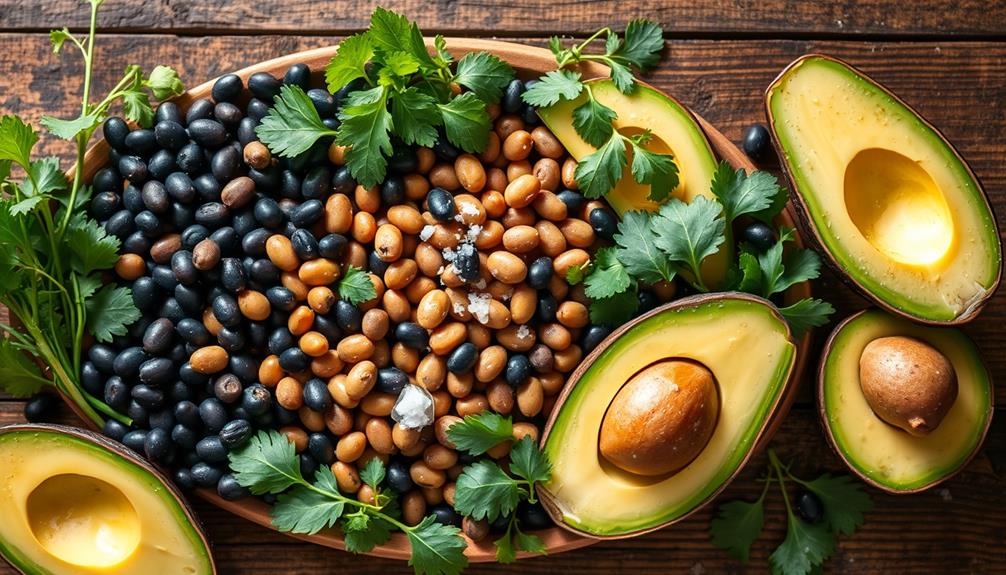You can know the keto diet is working by monitoring several key indicators. First, check for increased ketone levels between 0.5 and 3 mmol/L through blood tests or breath analyzers. You'll likely notice some weight loss initially, often due to water, with the real fat loss taking a bit longer. Pay attention to any symptoms like keto breath, increased thirst, and possibly fatigue—all common as your body adjusts. Regularly tracking these signs guarantees you're on the right path. There's plenty more to uncover about optimizing your journey, so keep exploring those insights for better results!
Key Takeaways
- Monitor blood ketone levels; effective ketosis is indicated by values between 0.5 to 3 mmol/L.
- Notice changes in appetite; reduced cravings and feelings of fullness suggest the diet is working.
- Observe physical symptoms like "keto breath" and darker urine, indicating ketone production and excretion.
- Track weight loss; initial drops may be water, but sustained loss of 1-2 pounds weekly indicates fat utilization.
- Experience improved energy levels and mental clarity, which are positive signs of effective fat burning during ketosis.
Indicators of Ketosis

When you're on the keto diet, several key indicators can confirm that you're entering ketosis. One of the most reliable signs is increased ketones in your blood, typically ranging from 0.5 to 3 millimoles per liter. This level indicates that your body is effectively shifting to fat as its primary fuel source.
You might also notice changes in your breath, often referred to as "keto breath," which has a distinct fruity or sweet odor due to ketone production. It's crucial to monitor your body's responses, as understanding cold medications overview can help you manage any symptoms that may arise during this dietary change.
Urine changes are another indicator; you may experience darker urine and more frequent trips to the bathroom as your body excretes excess ketones. While these signs are promising, be aware that initial weight loss on the keto diet often reflects water loss rather than true fat loss, which can take several weeks to appear.
It's not uncommon to experience temporary fatigue or changes in sleep patterns during this adaptation phase. These ketosis symptoms are part of your body adjusting to the dietary changes.
Recognizing these indicators can help you understand that you're on the right track with your keto journey.
Weight Loss Progress
As you monitor the indicators of ketosis, weight loss progress becomes a key focus of your keto journey. Initially, you might notice a drop in weight due to water loss from reduced carbohydrate intake, often shedding 2-10 pounds in the first week.
However, as your body adapts to ketosis, sustainable weight loss typically averages 1-2 pounds weekly, fueled by burning stored fat for energy. It's crucial to stay hydrated during this process, as proper hydration supports metabolic functions and overall health, similar to the benefits of celery juice's natural diuretic properties.
To keep your progress on track, regularly check your weight and body measurements. A reduction in waist size is a positive sign, indicating fat loss and improved body composition.
Tracking your macronutrient intake is equally important; maintain a daily carbohydrate limit of 20-50 grams to guarantee your body stays in fat-burning mode.
Common Symptoms Experienced

Many people experience distinct symptoms when the keto diet is effectively working. These common side effects often arise as your body adjusts into ketosis, where it burns fat for fuel instead of carbohydrates. Here's a quick overview of what you might notice:
| Symptom | Description | Cause |
|---|---|---|
| Dry Mouth | Increased thirst and a parched feeling | Dehydration and ketone bodies |
| Keto Breath | A sweet or fruity odor from your breath | Acetone production |
| Fatigue | Tiredness during the initial phase | Shift from carbs to fats |
You might also experience a decreased appetite due to more stable insulin levels, which reduces hunger hormones. Additionally, keep an eye on your urine color and frequency; darker urine may indicate elevated ketone levels as your body adjusts. Although you could face the so-called "keto flu" initially, these symptoms generally resolve within a week. Embrace these changes—your body is burning fat, and you're on the right path!
Hydration and Electrolyte Balance

Staying hydrated is essential on a ketogenic diet, as increased ketone levels can lead to dehydration.
Incorporating a balanced diet rich in fruits and vegetables can also support your hydration efforts, as these foods contain essential water content.
You might experience symptoms like dry mouth, muscle cramps, or fatigue if your electrolyte balance isn't managed.
Let's explore effective strategies for replenishing both hydration and electrolytes to keep you feeling your best.
Importance of Hydration
Hydration plays an indispensable role in the success of your ketogenic diet. As your body shifts into ketosis, increased ketone levels can lead to dehydration and electrolyte imbalances. It's imperative to drink plenty of fluids to support your health during this change.
Additionally, incorporating essential oils for respiratory health can aid in keeping your airways clear, especially if you're experiencing any discomfort during this phase. Warning signs like dark-colored urine and extreme thirst indicate you need to boost your fluid intake and replenish electrolytes.
Maintaining adequate levels of sodium, potassium, and magnesium is fundamental, as imbalances can lead to unpleasant muscle cramps and spasms. During the initial phase of ketosis, your body excretes more electrolytes, which may cause symptoms associated with the "keto flu," such as fatigue and headaches.
Regular monitoring of your hydration status and electrolyte levels is indispensable. Don't wait for symptoms to arise; instead, proactively confirm you're drinking enough water and considering electrolyte supplementation.
This approach will help you avoid complications and keep your body functioning at its best while following a ketogenic diet. Prioritizing hydration won't only enhance your overall well-being but also improve your chances of successfully adapting to and thriving on a keto lifestyle.
Electrolyte Imbalance Symptoms
Electrolyte imbalances can sneak up on you during the early stages of the ketogenic diet, leading to a range of uncomfortable symptoms. One of the most common symptoms of dehydration is increased thirst and a dry mouth, which signals that your body needs more fluids.
You might also notice darker urine or a decrease in urination frequency, both indicators of dehydration that require a boost in hydration and essential electrolytes. It's important to manage your finances, just as you'd manage your hydration, to guarantee you have the resources to maintain a healthy lifestyle, including proper nutrition and supplements for your diet budgeting for health.
As you adapt to ketosis, you could experience muscle cramps and spasms due to imbalances in potassium, sodium, and magnesium. These essential electrolytes are vital for maintaining proper hydration and function.
Additionally, keep an eye out for symptoms like fatigue, headaches, and irritability, which are common signs of an electrolyte imbalance and may contribute to what's often referred to as the keto flu.
Being aware of these symptoms can help you identify potential issues early on, allowing you to make adjustments and stay on track with your ketogenic diet.
Strategies for Replenishment
Keeping your body in balance is essential when following a keto diet, especially as it can lead to dehydration and electrolyte imbalances.
Understanding the importance of financial considerations for elderly care can also provide insights into maintaining overall well-being while managing dietary changes.
To maintain proper hydration and prevent symptoms associated with mineral deficiencies, consider these strategies for replenishment:
- Drink plenty of fluids: Aim for at least 2-3 liters of water daily to combat dehydration as your body enters ketosis.
- Supplement electrolytes: Focus on sodium, potassium, and magnesium to alleviate symptoms of "keto flu," like fatigue and muscle cramps.
- Eat low-carb, electrolyte-rich foods: Incorporate leafy greens, avocados, and nuts into your meals to support electrolyte balance and hydration.
- Monitor your body's signals: Pay attention to dark-colored urine and extreme thirst, which can indicate dehydration and the need for electrolyte replenishment.
Health Benefits Observed

As you stick to the keto diet, you might notice significant weight loss, often averaging 1-2 pounds per week.
Alongside this, many find their energy levels improve, giving them a boost throughout the day.
These health benefits can be encouraging signs that your keto journey is on the right track.
Weight Loss Progress
When you commence on a ketogenic diet, you may notice significant weight loss progress in both your physique and overall health. Initially, you'll experience rapid weight loss, primarily from water weight, but this shifts to sustained fat loss as your body adapts to burning fat for energy.
This transformation can be further supported by understanding the key domains of development that influence your overall well-being. Here's what you can expect:
- Caloric Deficit: By maintaining a caloric deficit, you encourage your body to utilize stored fat, leading to steady weight loss.
- Appetite-Suppressing Effects: The ketogenic diet reduces ghrelin levels, the hunger hormone, which helps diminish cravings and enhances your sense of fullness after meals.
- Improved Body Composition: Over time, a well-followed keto diet can lead to improved body composition, maximizing fat loss while preserving lean muscle mass.
- Stable Blood Sugar Levels: As your body adapts, you may notice improved blood sugar levels, contributing to better health and reducing the risk of insulin-related issues.
These benefits highlight how the ketogenic diet can positively impact your weight loss journey, promoting both fat loss and overall health improvements.
Stay committed, and you'll likely see these changes unfold!
Improved Energy Levels
After experiencing weight loss progress on the ketogenic diet, you'll likely notice another significant benefit: improved energy levels. This boost comes from a metabolic process that occurs when your body learns to burn fat instead of carbs for fuel.
As you adapt to consuming fewer carbohydrates, your body becomes more efficient at utilizing fat stores, providing a stable energy source. Additionally, adopting an efficient system, similar to how energy-efficient models can reduce heating costs, can enhance your overall lifestyle.
Many individuals report enhanced physical performance during activities, as fat can sustain energy levels for prolonged periods. The ketogenic diet helps maintain stable blood sugar levels, reducing those frustrating energy crashes that can occur with high-carb diets. This consistency means you can expect to feel energized throughout the day.
Additionally, as your body shifts into ketosis, you may experience reduced feelings of fatigue, leading to improved mental clarity and productivity. A well-formulated ketogenic diet, rich in healthy fats and adequate protein, supports these sustained energy levels.
Monitoring Ketone Levels
Monitoring ketone levels is essential for anyone on a ketogenic diet, as it provides valuable insight into your body's state of ketosis. By regularly checking these levels, you can guarantee you're on the right track to induce ketosis effectively.
Here are some methods to monitor your ketone levels:
- Blood Tests: These offer the most accurate measurements of ketones, with nutritional ketosis defined as blood ketone levels between 0.5 and 3 millimoles per liter.
- Urine Test Strips: While convenient, these strips may not be reliable after your body adapts to using ketones efficiently.
- Breath Analyzers: These devices measure acetone levels, a type of ketone, and provide a non-invasive option for monitoring ketosis.
- Adjusting Macronutrient Intake: Regular testing can help you tweak your macronutrient intake to maintain ideal ketone levels, guaranteeing the diet remains effective.
Long-Term Considerations

Maintaining a ketogenic diet over the long term requires careful consideration of various factors that influence both weight loss and overall health. While you might experience sustained weight loss, typically 1-2 pounds per week after adapting to ketosis, it's vital to focus on nutritional balance.
Incorporating gentle stretching before bedtime can also help alleviate any discomfort that may arise from dietary changes, guaranteeing overall well-being Yoga for Back Pain. Confirming an adequate intake of vitamins and minerals from low-carb vegetables and healthy fats can help prevent deficiencies that could undermine your health.
Regular monitoring of your ketone levels is fundamental, as it allows you to verify you're in ketosis and make necessary dietary adjustments. This practice not only supports your weight loss goals but also enhances cognitive function and may lower the risk of neurodegenerative diseases, highlighting the diet's long-term health implications.
However, the sustainability of the ketogenic diet can be debated. Many experience weight regain when reverting to regular diets, emphasizing the importance of integrating lifestyle changes to guarantee lasting results.
Ultimately, balancing your approach to the ketogenic diet will help you maximize its benefits while minimizing potential drawbacks. Prioritize long-term habits that support your goals, and you'll be better equipped to maintain your progress.
Frequently Asked Questions
How Do You Know if Keto Is Working?
You'll notice weight loss, reduced appetite, and increased energy levels. Testing ketone levels and observing physical symptoms like "keto breath" can also confirm that your body's effectively burning fat for fuel and entering ketosis.
How Long Does It Take to See Results From the Keto Diet?
You might think results come instantly, but on the keto diet, you'll likely notice changes after a week. Full adaptation takes 2 to 4 weeks, leading to noticeable fat loss and increased energy.
How Do You Know You're Burning Fat on Keto?
You can tell you're burning fat on keto by feeling less hungry, losing weight steadily, noticing increased energy, and experiencing that sweet "keto breath." Checking blood ketone levels can confirm you're in nutritional ketosis too.
Do You Pee Out Fat on Keto?
You won't exactly "flush away" fat while on keto. Instead, your body's shedding water and ketones through urine. While you might notice changes, true fat loss happens through metabolic processes, not bathroom visits.
Conclusion
As you navigate your keto journey, remember it's like tuning an instrument; small adjustments lead to beautiful harmony. Keep an eye on your body's indicators, from weight loss to improved energy levels, and listen to what it's telling you. Staying hydrated and monitoring your ketone levels will help you maintain balance. Celebrate each milestone, and embrace the health benefits that come along. Trust the process, and soon you'll be playing your own unique melody of wellness.









